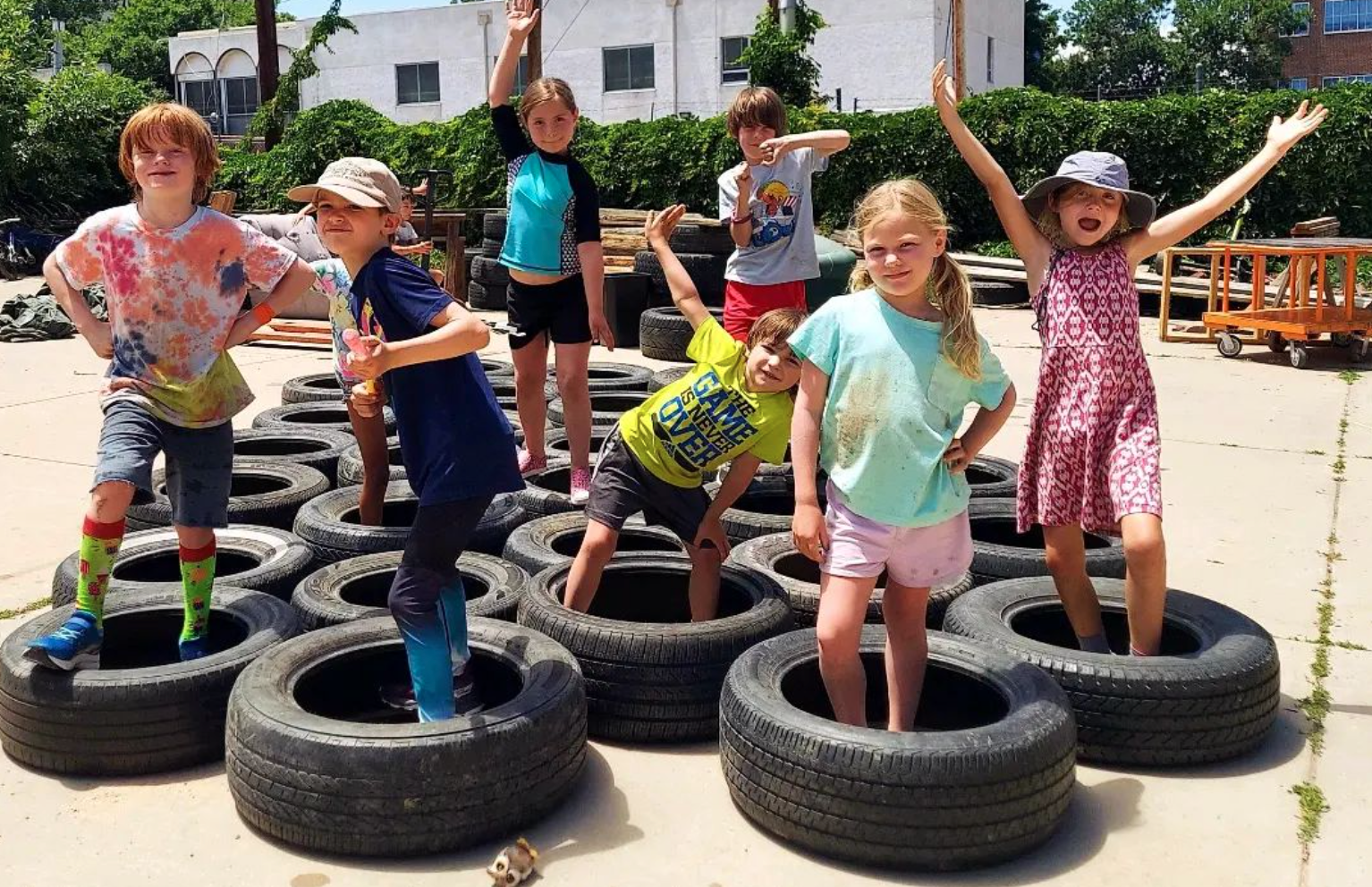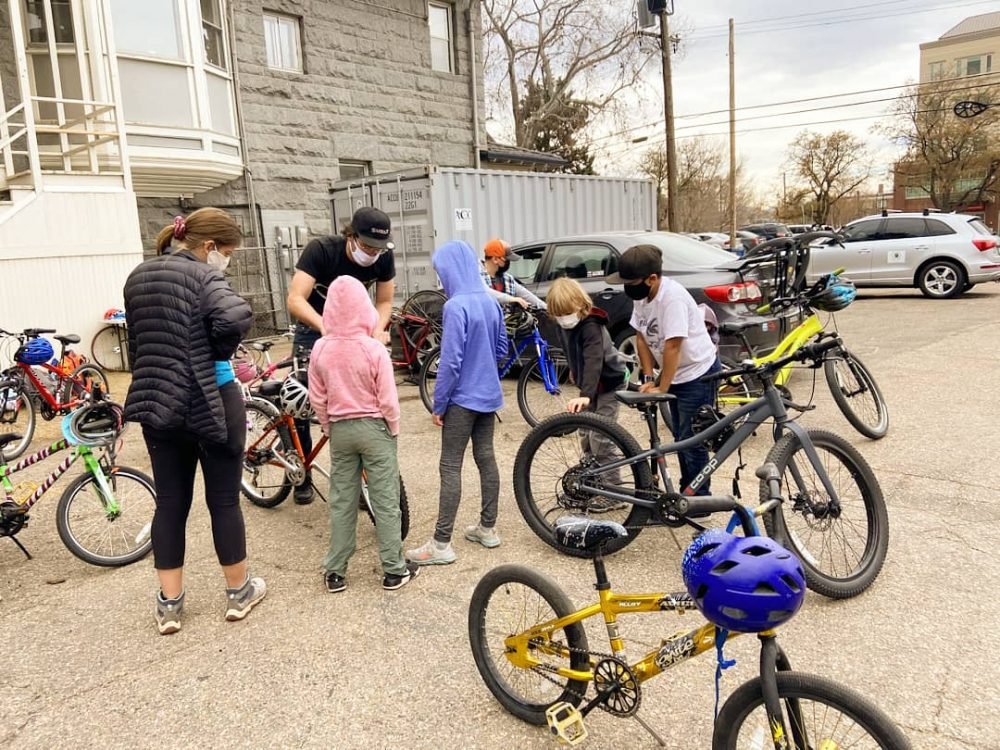Worldmind Elementary School
An inclusive, independent outdoor-based and place-based school for students grades 1-5

At a Glance
Grades 1-5
Outdoor-based and place-based education
Supportive environment for neurodiverse, gifted & twice-exceptional students
Individualized learning
Focus on social and emotional development
Learning in nature and at the historic Milheim House
Small class sizes & small student to teacher ratios
Multi-age classrooms
STEM + Art/Design curriculum
Real-world learning
Forest School
Microschool
Robotics with the Colorado School of Mines
Mission and Vision Statements
Worldmind creates inclusive spaces for neurodiverse individuals and their families. We build communities where members feel safe, respected, and valued, and ignite in them a greater love and appreciation for themselves and others.
We reunite neurodiverse individuals with the world by creating nature-inspired, placed-based experiences that spark engagement, development, awareness, and connection. We intentionally link individuals' understanding of bio and social diversity so that they evolve into compassionate, self-actualized members of our local and global societies.
The Importance of Social & Emotional Learning with Dr. Ali Hill
Learn about why Worldmind puts social and emotional learning at the foundation of the school and how it strengthens all learning opportunities in the classroom.
Worldmind Student Life Cycle
for Elementary & Middle School Students
-

Initial Adjustment (Anxiety and/or Honeymoon Phase)
Students often experience signs of anxiety and uncertainty and/or a temporary uplift in mood and engagement.
-

The Journey of Unmasking
Unmasking is a critical and often challenging phase where students gradually shed protective layers. An escalation in Stage 1 behaviors is often seen both in school and at home.
-

Embracing Self-Acceptance & Understanding Others
A pivotal point in the students' journey, often marked by significant struggle. Students may show resistance to attending school during this phase.
-

Achieving Self-Acutalization
The ultimate goal is for Worldmind students to be well-equipped to interact with the world around them in a confident, understanding, and empathetic manner.
There are four stages in the Worldmind Student Life Cycle for elementary and middle school students. These stages represent what we commonly see in our students during their attendance at Worldmind.
Stage 1 begins as a new student enters at any grade level elementary through middle school.
We create an inclusive community where all students have individualized learning plans tailored to their specific needs and aptitudes.
Our Curriculum
Real-World Learning
Worldmind incorporates an even balance of head (academic achievement), heart (character-building and well-being), and hand (problem-solving, creating, and idea development). This is accomplished through a carefully crafted curriculum that incorporates Real-World Learning. Real-World Learning lends itself to place-based and project-based approaches to pedagogy.
Real-World Learning also incorporates civic education. Through this innovative type of education, teachers can encourage students to see not only their home and school, but also the city and surrounding areas in which they are located, as a real world classroom. Teachers will assign projects that help students to map and engage with real world issues and initiatives in the community. This will be accomplished through multiple field trips throughout the school year. Field trips bring people together in ways that go beyond traditional classroom experiences.
Literacy
Worldmind uses the Orton-Gillingham literacy curriculum which helps teach reading more effectively. Orton-Gillingham allows children to break down how and why letters and words sound the way they do. Using multiple senses, children can better understand the rules of the English language. This is effective in the classroom because it allows educators to teach children in the way that each individual child learns best.
STEM
STEM an interdisciplinary and applied approach to teaching four specific disciplines — science, technology, engineering and mathematics. Worldmind works with Mathletes & Bookworms to create a robust STEM curriculum that integrates our real-world learning model. Our math curriculum comes from EngageNY; these modules are marked by in-depth focus on fewer topics.
Fostering Creativity with Parent and Engineer Hao Zhng
“The United States has developed as a global leader, in large part, through the genius and hard work of its scientists, engineers, and innovators. In a world that’s becoming increasingly complex, where success is driven not only by what you know but by what you can do with what you know, it’s more important than ever for our youth to be equipped with the knowledge and skills to solve tough problems, gather and evaluate evidence, and make sense of information. These are the types of skills that students learn by studying science, technology, engineering, and math—subjects collectively known as STEM.”
– The U.S. Department of Education
Supplemental Programs
Forest School
Forest School is a unique learning philosophy that offers people of all ages the opportunity to learn personal, social, technical, academic and environmental skills in a natural environment. This part of our curriculum combines environmental education with forest school skills which include: fire skills (building, lighting, maintaining, cooking, putting out, and leave no trace), forest tools (using a variety of different tools to create with wood), nature art and design, and shelter building.
Two Worldmind teachers trained in the UK Forest School model lead this programming for our Worldmind Elementary students in one 2-hour session per week.
Robotics & Coding
All Worldmind Elementary School students participate in our robotics and coding lessons that were created with the Colorado School of Mines. Megan Patterson continues to work with Mines students and staff to create more content for lessons.
“From daily school refusal to loving school in less than a year. My daughter is autistic and feared almost all interaction w/o me since she was 4. We started here in March 2023 and now she's thriving. Her brother joined her this school year and the growth from his has also been tremendous. Life changing for us is not an exaggeration.” - Worldmind parent
Enrollment
1st-5th grade | Monday - Friday | 8:25 AM - 3:30 PM
Enrollment Process for Worldmind Elementary School
Call us with any questions before scheduling a tour: 303.970.9785
Schedule a tour and parent interview here to see if your family would be a good fit for Worldmind.
Fill out an online enrollment application here. There is a $75 application fee.
Set up a trial day. If the trial day is a success, an acceptance letter and tuition contract will be sent via email.
Sign and return contract.
Pay a non-refundable deposit of $1,000. This deposit will be applied to the tuition balance.
Tuition
Application Fee: $75
Worldmind Elementary School | 2024-2025 Year Tuition:
1st child - $20,000 + extra fees for school trips
2nd child - $18,000 + extra fees for school trips
Tuition Deposit: $1,000
We offer the following tuition payment plans:
One Payment – The tuition deposit is deducted from the total tuition and the balance is due August 5th, or on the first day of the month in which the student begins attending Worldmind, at a prorated rate. Payment methods include credit card with a 3% transaction fee, ACH transfer or check with no transaction fees.
Two Payments – The tuition deposit is deducted from the total tuition and the balance is divided into two equal payments due August 5th, and November 5th, or beginning on the first day of the month in which the student begins attending Worldmind and on the first day of a subsequent month to be determined by Worldmind. Payment methods include credit card with a 3% transaction fee, ACH transfer or check with no transaction fees.
Ten Payments – The tuition deposit is deducted from the total tuition, a service charge of $10 per month is added, and the balance is divided into ten equal payments, or beginning on the first day of the month in which the student begins attending Worldmind. Tuition payments are due the first day of every month, starting August 1, 2024, and ending May 1, 2025.
Deposits – A non-refundable deposit of $1,000 per student is due upon acceptance into the school. This deposit will be applied to the tuition balance.
Tuition Discount – There is a 10% discount for siblings.







